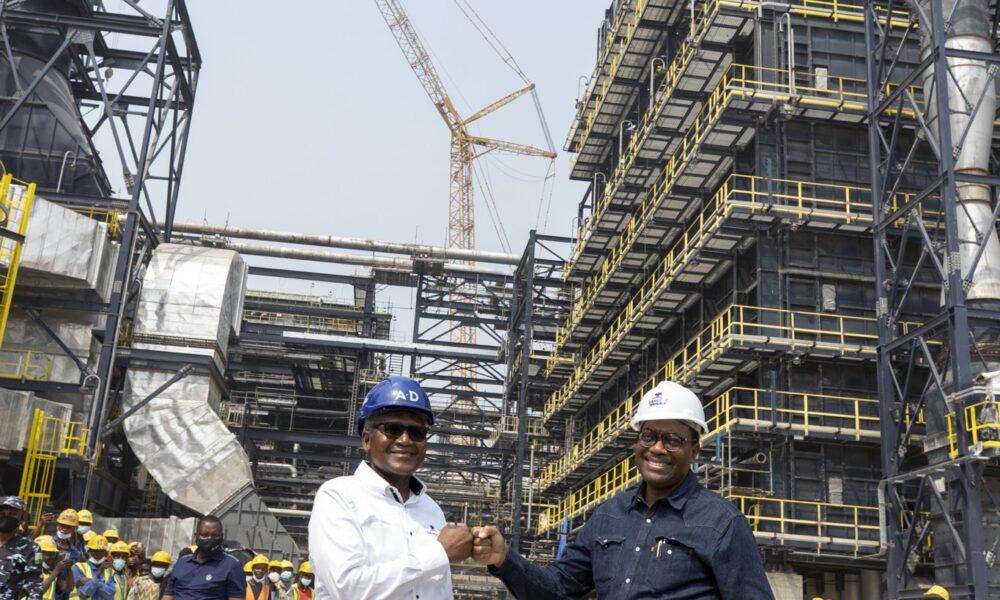
Abba Hamisu Sani
Africa-Press – Nigeria. As President Muhammadu Buhari’s tenure of 8 years from 2015 to 2023 is ending by 29th May this year ,commissioning of Dangote’s refinery will be one of his final functions as the leader of the largest African economy.
The facility which is the largest oil refinery in Africa and one of the largest globally has the capacity of refining 650,000 barrels of crude oil per day.The refinery was initially expected to be completed in the year 2021.
It will also produce 50 million liters (13.2 million gallons) of gasoline and 15 million liters (4 million gallons) of diesel fuel per day. And it will create nearly 35,000 jobs.
Background of the project
Dangote Group launched the project in 2016 with an estimated investment of US$12 billion. The project team hit a major milestone in December when it installed the world’s largest crude distillation column, a processing tube as long as a football pitch and as heavy as 320 elephants.
The potentials of Nigeria to save 10 million dollar in foreign exchange
Africa’s richest man and owner of the Dangote Refinery, Mr. Aliko Dangote, has said with the planned commencement of the refinery located in Lagos, Nigeria could save up to $10 billion in foreign exchange (FX) and generate another $10 billion in exports when the facility begins operation.
The 650,000 barrels per day Dangote Refinery, the world’s largest single-train refinery, is set for inauguration on May 22, by President Muhammadu Buhari.
Dangote started this in an interview with a special edition of London-based media outlet The Economists Magazine, titled ‘The World Ahead 2023,’ which was unveiled with considerable focus on West Africa and aimed to highlight both the potential as well as areas for improvement in Africa.
Expressing his views on expectations for the creation of value-added industries in Africa, the richest black man in the world stated that Nigeria’s economy as presently constituted has largely been built around the extraction and exportation of its natural wealth.As a major oil producer, Dangote noted that Nigeria currently imports over 90 per cent of its refined petroleum products, which amounted to roughly $10 billion in imports in 2022.
While this has brought major benefits to many businesses, Dangote explained that more prosperity could be created by locally refining Nigeria’s resources, with the refinery being a major step in this direction by reducing the country’s dependence on imported refined petroleum products.
“The refinery’s completion will not only create direct and indirect jobs, but also lead to skills transfer and technology acquisition opportunities that will benefit the downstream sector.
“Moreover, the refinery’s production of critical products like naphtha and polypropylene will stimulate the development of other industries, such as cosmetics, plastics, and textiles. Refineries on this scale could save Nigeria up to $10 billion in foreign exchange and generate approximately $10 billion from exports” Dangote said.
He noted that the soon to be commissioned 650,000 barrels per day refinery in Lagos, would enable Nigeria achieve self-sufficiency in refined petroleum products, as well as export to other African markets.
Dangote stressed that Nigeria presents an attractive investment opportunity for international investors, saying with the country’s abundance of natural resources, diversifying and digitizing economy, youthful demographics and vibrant society, investors will find in Nigeria a country of many possibilities.
“Its population of over 200 million — of which 40 per cent is under the age of 15 means the country’s demographic dividend offers investors with a long-term view an encouraging option in several sectors” The renown business man added.
Dangote refinery set for commissioning
Azu Ishiekwene is the Editor-in-Chief LEADERSHIP newsPaper and a Public affairs analyst. He described the Dangote refinery project as a milestone for Africa’s economy in an article titled ” Dangote Refinery challenges global narrative” Published by Premium Times online news paper recently.
He said after unforeseen delays, including cost reviews (from the original $12-$14 billion to $19 billion), not to mention energy transition concerns, the glut in global supply caused by COVID-19 and spooky markets caused by the Russia-Ukraine war, the refinery is now set for official commissioning on 22 May.
“One source told me that perhaps the most significant recent reason for the delay was the need to synchronize power supply to the Fluid Catalytic Cracking Unit (FCCU), which has now been significantly completed by General Electric.” Azu mentioned
Apart from an estimated 250,000 direct and indirect jobs that the refinery would create, the refinery is also expected to spin off other business opportunities.
S&P Global reported two months ago that early commencement of the Dangote Refinery would not only benefit Nigeria, but could also benefit Africa, currently suffering a shortage of diesel as a result of the closure of three of five refineries in South Africa.
The continent imports about 700,000 barrels per day of diesel. Diesel is one of the four quality Euro-V products expected from Dangote Refinery. Others are gasoline, jet fuel and polypropylene.
For More News And Analysis About Nigeria Follow Africa-Press






